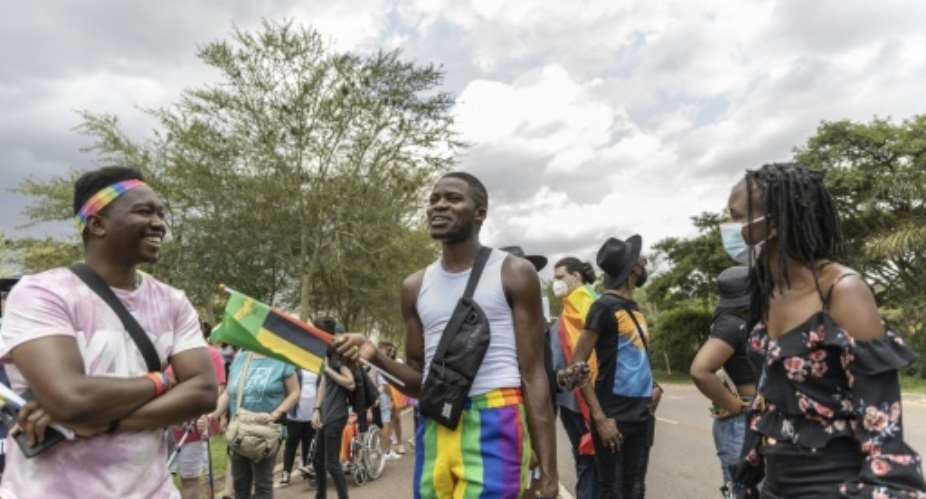Kenyan asylum seeker Pallo Mandela dreamt of freedom on his seven-day bus journey to South Africa. His brother had found him in bed with a man, and now he was fleeing for his life.
"He became very wild and very toxic," said the 27-year-old, conjuring the painful memories from a small suburban house outside Pretoria, where he now lives.
"He came with a bottle to hit my head and said he was going to kill me," said Mandela, who arrived in South Africa in February 2020.
Gay sex is banned in Kenya, and the police arrested him on the spot. Days later, queer activists paid bribes for his release and told him to "disappear".
"The only option I had was to come to South Africa," Mandela told AFP.
"That was the only safe space where I knew the government accommodated queer people."
But his dreams of finding a more accepting society were short-lived.
With some of the world's most progressive LGBTQ+ laws, South Africa attracts queer migrants from the continent and beyond escaping prosecution and homophobia.
The country in 1996 was the first to constitutionally ban discrimination on the grounds of sexual orientation.
In 2006, it became the only nation to legalise same-sex marriage in Africa, where social codes are often conservative and many countries consider homosexuality a crime.
 Mulaisho says he has come up against xenophobic sentiment in South Africa despite its "beautiful laws" and relatively progressive outlook compared with neighbouring countries. By Guillem Sartorio (AFP)
Mulaisho says he has come up against xenophobic sentiment in South Africa despite its "beautiful laws" and relatively progressive outlook compared with neighbouring countries. By Guillem Sartorio (AFP)
Yet gay rights are often only protected on paper.
Many queer migrants say South Africa is more close-minded than they expected. As foreigners, they are also victims of widespread xenophobic sentiment.
"I have been harassed so many times walking with my transgender friends, people who are who they are," said Mandela, gold earrings framing his worried features.
"We get judged, robbed, insults and death threats," he sighed. "Imagine dealing with xenophobia and insecurities about your sexuality at the same time."
'Queer' and 'black'
Anold Malushio used to dream of taking part in the colourful South African gay prides he watched on his phone from his home town in Zambia.
The 26-year-old has joined several parades since he migrated in 2017, waving a Zambian flag in tight rainbow shorts.
But he is still battling for paperwork.
Immigration authorities rejected Malushio's application for refugee status after months of uncomfortable interviews.
"Once, the manager took out a Bible and started preaching to me about homosexuality," said Malushio.
"South Africa has got the most beautiful laws," he said. "But the people they put in their offices are so ignorant about queerness."
Being in legal limbo and easily jeered by officials makes migrants like Malushio easy targets for street crime.
 Kenyan asylum seeker Kevin Aruwa says he has come up against harassment in South Africa -- "but not like in Kenya... where you cannot even dress a certain way". By Guillem Sartorio (AFP)
Kenyan asylum seeker Kevin Aruwa says he has come up against harassment in South Africa -- "but not like in Kenya... where you cannot even dress a certain way". By Guillem Sartorio (AFP)
He avoids walking into town for fear of being mugged.
One night in 2017, he was sexually assaulted by two men and then chased away from a police station where he sought refuge.
It took returning with a white male friend for officers to open a case.
"It is more difficult to be queer as a black person" in South Africa, Malushio said, comparing his experience to a white queer friend from Australia.
"He got his documentation, is dating and working," he said.
"He is never called migrant or queer... it's easier when you are white."
Kevin Aruwa, a Kenyan model who Malushio befriended, sat quietly by the window.
 Members of the LGTBI community celebrated Pretoria Pride on December 4. By GUILLEM SARTORIO (AFP/File)
Members of the LGTBI community celebrated Pretoria Pride on December 4. By GUILLEM SARTORIO (AFP/File)
In hiding and on the run since 2017, he finally found some solace when he landed in South Africa last year.
"I have been harassed," he said. "But not like in Kenya... where you cannot even dress a certain way."





 Ejisu by-election: Vote for Kwabena Boateng to come and help me complete my work...
Ejisu by-election: Vote for Kwabena Boateng to come and help me complete my work...
 ‘He’s just hungry’ – NPP Germany takes Mr. Beautiful to the cleaners; schools hi...
‘He’s just hungry’ – NPP Germany takes Mr. Beautiful to the cleaners; schools hi...
 Politicians have hijacked ownership of media houses to suppress press freedom — ...
Politicians have hijacked ownership of media houses to suppress press freedom — ...
 Dumsor: Bawumia admits power challenges; assure Ghanaians they will be over soon
Dumsor: Bawumia admits power challenges; assure Ghanaians they will be over soon
 SML deal is just a modified form of the Agyapa deal – Bright Simons
SML deal is just a modified form of the Agyapa deal – Bright Simons
 SSNIT authorities should be appointed by contributors, not the government — Aust...
SSNIT authorities should be appointed by contributors, not the government — Aust...
 Court rejects request to compel Akufo-Addo to accept anti-gay bill for possible ...
Court rejects request to compel Akufo-Addo to accept anti-gay bill for possible ...
 Theft and vandalism cause of darkness on Tema motorway — Road Ministry
Theft and vandalism cause of darkness on Tema motorway — Road Ministry
 Akufo-Addo has shown he’s not interested in preserving Ghana’s democracy — Maham...
Akufo-Addo has shown he’s not interested in preserving Ghana’s democracy — Maham...
 Ejisu by-election: Aduomi’s vote rigging allegations baseless – Akufo-Addo
Ejisu by-election: Aduomi’s vote rigging allegations baseless – Akufo-Addo
